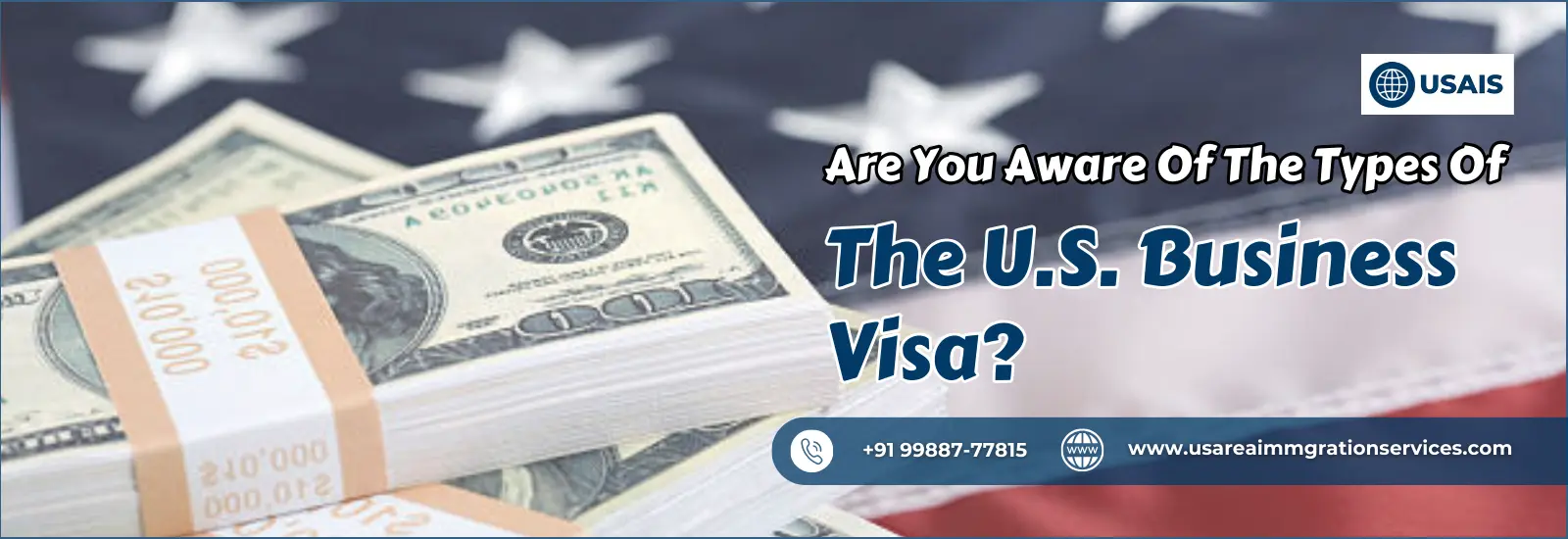Although applying for a business visa to the United States can be a difficult process, you can improve your chances of getting it approved. You can also prevent your visa from being denied by being well-prepared and paying close attention to detail. If you are aware of the types of the US business visa then it gets easy for you to apply for a US business visa.
A US Business Visa: What Is It?
With the help of a business visa, foreign nationals can enter the United States for business purposes. Permanent residency is not granted by them as these visas are non-immigrant.
Business visa holders are only permitted to engage in temporary business-related activities within the United States. Usually, it takes weeks to months depending on the reason for the visit and the judgment of the issuing authority.
US Business Visa Types
Let’s examine the various categories of US business visas that are available to help you comprehend the precise activities that are allowed and the length of your stay. Examine them in more detail below:
VISA B-1/B-2 for Business
For foreign visitors wishing to enter the US temporarily, a B-1/B-2 business visa is a temporary non-immigrant visa. It permits travel for business purposes (B-1), pleasure (B-2), or even a mix of the two (B-1/B-2).
In general, foreigners with a B-1 visa can attend conferences and conventions, settle estates, negotiate contracts, and consult with US business associates. Generally, it forbids running a company or providing consulting services.
On the other hand, leisure travel is covered by the B-2 visa. This covers taking a trip, seeing friends, and getting medical attention. As long as you’re not getting paid, you may also take part in sporting events, music performances, or competitions.
These visas are frequently combined and issued under the B-1/B-2 visa.
Usually, this visa is issued with a six-month initial validity period. This is sufficient time, according to the US Embassy, to conduct business and travel within the nation.
Treaty Visas E-1 and E-2
Citizens of nations that have commerce and navigation treaties with the United States are eligible to apply for the E-1 Treaty Trader and E-2 Treaty Investor visas. It enables them to:
-
- carry out substantial trade, mostly between the US and their home country, encompassing services and technology.
- manage a company they have invested in.
- Make a sizable financial investment.
Argentina, Spain, the Philippines, Pakistan, Japan, Canada, Greece, Ireland, and Singapore are a few of these nations.
There are distinctions between these visas even though they both support significant diplomatic and commercial ties between the US and the nations with which it has signed treaties. If you hold an E-1 visa, for instance, you prioritize trade over employment. This is an option to work for yourself in the US through trade; hiring US workers is not required.
An E-2 visa, however, necessitates that you establish employment in the US. Your investment needs to be a legitimate company, not just a means of subsistence. You will have to demonstrate how your business plans to hire Americans.
Additionally, their grounds for rejection differ. If the majority of your trade isn’t between the US and your home country, or if your trade volume is too low, your application for an E-1 visa may be denied. In the meantime, among many other reasons, an E-2 visa may be denied if the applicant does not hold a leadership position or if the investment is too small for the targeted industry.
L-1 Visa
For a restricted period, international businesses can temporarily relocate qualified employees from their offices abroad to the US with an L-1 visa, a non-immigrant visa..
As this visa enables the employees to send the key personnel including the specialties and the managers to the United States to oversee operations, manage projects, and impart their knowledge, so the multinational corporations find this visa appealing.
Following are the two types of L1 visas:
-
L-1A visa: It is primarily intended for the managers and the executives of the organization. With the help of the L-1A visa, they can relocate to a US branch, subsidiary, affiliate, or even the parent company of their current employer.
-
L-1B visa: This type of visa is used only by the experts. The employees with the specialized knowledge are transferred to the office in the United States. This included anything from the business’s goods to its technological procedures.
Last Words
There’s no doubt that when it comes to business and entrepreneurship, the US leads the world. The nation is home to the wealthiest, most well-known corporations in the world, such as Apple, Microsoft, Amazon, and Facebook.
It follows that people traveling by plane to pursue the American dream is not surprising. You have access to a broad market, favorable tax laws, business-friendly policies, and financing-rich accelerator programs.
Additionally, you can take advantage of these opportunities if you hold a US business visa. All you need to know to get started is the eligibility requirements, the application process, and any questions you might need to respond to. The secret is to prepare!
Managing your finances internationally becomes a crucial factor to take into account after your visa is granted. Fortunately, US Area Immigration Services can be the best place for you to start when it comes to organizing and setting up shop in the US.
Frequently Asked Questions (FAQs)
What happens if my application for a US business visa is rejected?
You can reapply and review the reasons for the initial denial if your visa application is denied. In this case, speaking with a consultant could also be beneficial.
Do I need a business visa to enter the US?
An American business visa may be available to you if:
- You are visiting the US for a justifiable business purpose.
- You work for a foreign corporation.
- You will return home after your visa expires because of your close ties to your nation of origin.
- You possess the necessary financial means to pay for your trip.

